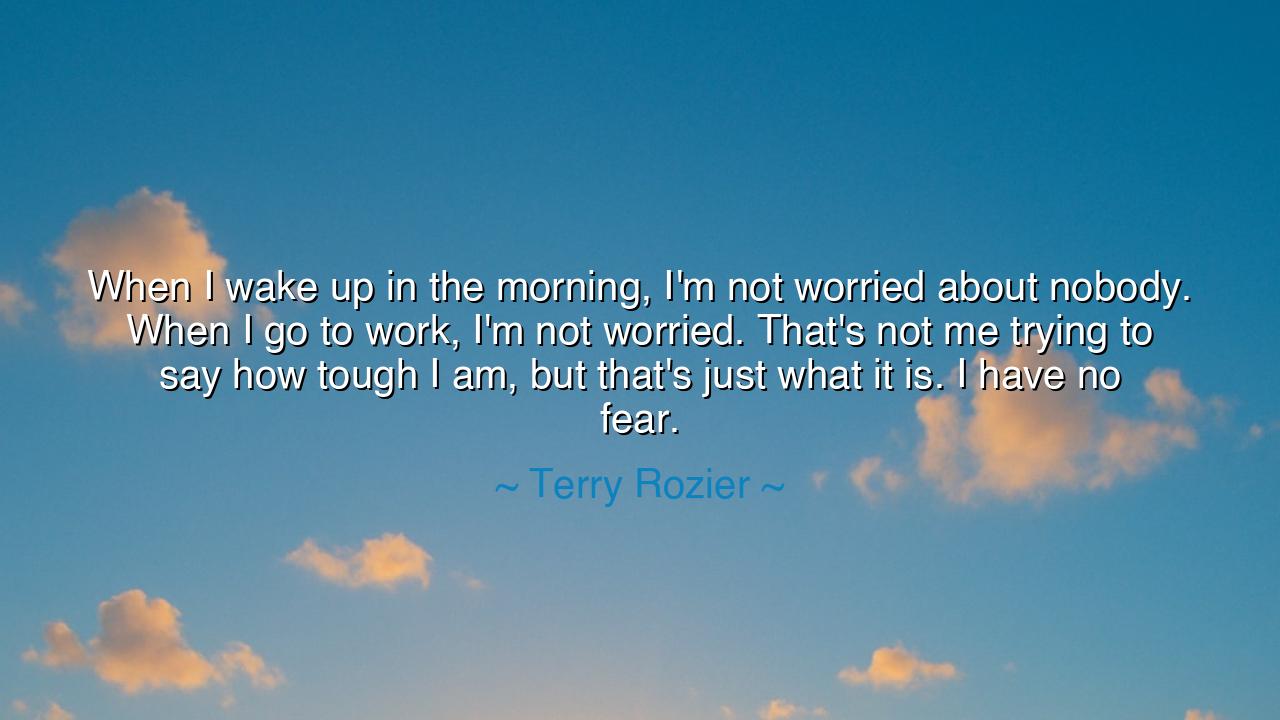
When I wake up in the morning, I'm not worried about nobody.
When I wake up in the morning, I'm not worried about nobody. When I go to work, I'm not worried. That's not me trying to say how tough I am, but that's just what it is. I have no fear.






"When I wake up in the morning, I'm not worried about nobody. When I go to work, I'm not worried. That's not me trying to say how tough I am, but that's just what it is. I have no fear." — Terry Rozier. In these words, Terry Rozier reveals a profound inner strength, an attitude that is often spoken of in ancient wisdom: the ability to face the challenges of the day without fear, without worry, and without hesitation. Rozier speaks not of a boastful, hollow bravado, but of a quiet confidence that comes from within—a sense of self-assurance that stands firm in the face of adversity. To wake each morning with a calm heart, untouched by the anxieties that often plague the minds of others, is a testament to inner peace and a profound faith in one’s own abilities.
In the ancient world, the idea of fearlessness was not just admired—it was a quality that defined the very character of heroes and leaders. The Spartan warriors, renowned for their courage and discipline, were taught from childhood to embrace the challenges of life with unyielding resolve. A true warrior, like Terry Rozier, did not fear the coming day, nor the battles that awaited them. The Spartans believed that fear was a weakness that could paralyze the mind, and thus, they trained their bodies and spirits to overcome it. For them, fearlessness was not arrogance, but an understanding that only through bravery could one rise to the occasion and fulfill their destiny.
Similarly, Alexander the Great, a conqueror of unparalleled ambition, demonstrated a life lived without fear. From the early days of his reign, he led his troops into battle with unwavering confidence, trusting in his abilities and the strength of his army. Alexander faced formidable enemies, vast territories to conquer, and countless dangers, yet he approached each challenge with the belief that he could overcome it. His fearlessness was not born from a lack of understanding the risks, but from an unshakable belief in his purpose and his vision for the world. In many ways, Rozier’s words echo this timeless lesson: fear is not to be defeated by force alone, but by the certainty of one’s mission and the resolve to stay true to it.
The ancient Stoics, too, understood the power of a mind free from fear. Epictetus, the great Stoic philosopher, taught that fear arises from our attachment to outcomes, from the belief that we control things beyond our power. In his teachings, Epictetus urged his disciples to focus not on the external forces that might cause them anxiety, but on their internal response to those forces. To live without fear, according to the Stoics, is to cultivate an unshakable sense of inner calm, regardless of the circumstances around you. Rozier, in his reflection, embodies this Stoic wisdom—his confidence comes not from denying the challenges that lie ahead, but from the knowledge that he can handle them with clarity and strength.
Consider also the example of Joan of Arc, the young warrior who led the French army against the English in the Hundred Years’ War. Though she was but a teenager, Joan faced the most daunting battles and enemies, yet she remained undaunted. She did not fear the challenges before her, for she believed with every fiber of her being that she was chosen for a greater purpose. Joan’s life is a testament to the power of faith in oneself and in the mission one pursues. Her fearless courage in the face of overwhelming odds is much like Rozier’s assertion that he faces the day with no fear—because when you are aligned with a higher purpose, fear becomes irrelevant.
In our own lives, we are often faced with challenges that cause us to feel uncertain, anxious, or fearful. Whether it is in our work, our relationships, or our personal struggles, fear has the power to paralyze us if we allow it. Rozier’s words remind us that the key to overcoming fear is not in avoiding challenges, but in facing them with confidence, knowing that we have the ability to navigate them. Fearlessness, as taught by Rozier, Alexander, and the ancient philosophers, is not the absence of fear, but the presence of purpose and belief in oneself.
The lesson is simple yet powerful: to live without fear is to live with a deep understanding of who we are and what we stand for. We must face each day with the certainty that we are capable of handling whatever comes our way. Just as Terry Rozier wakes each morning free from worry, so too must we embrace the challenges of life with a confident heart and an open mind. By focusing on what we can control—our thoughts, actions, and attitudes—we free ourselves from the burden of fear and open the door to growth, success, and true inner peace.
So, as you walk the path of your own life, remember Rozier’s words. Let them guide you to face each day with the unshakable confidence that no matter what challenges arise, you have the strength and the clarity to overcome them. In doing so, you will find that fear, though it may visit you from time to time, no longer holds power over you. For in the end, as the ancients knew, it is not the absence of fear that defines a great life, but the courage to move forward despite it.






AAdministratorAdministrator
Welcome, honored guests. Please leave a comment, we will respond soon